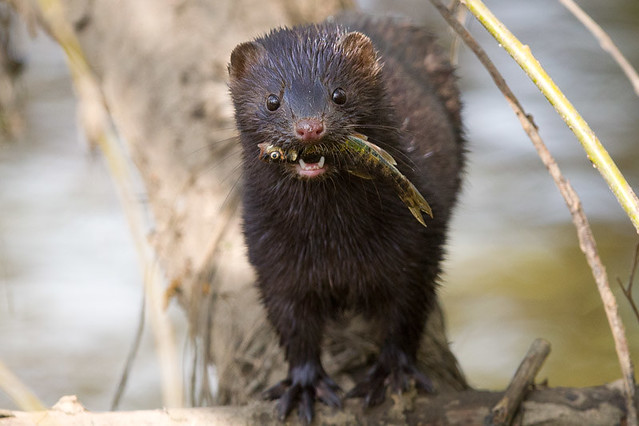College of Science Postgraduate Seminar Series - Spring 2014
3rd June 2014 - 1pm - Zoology Museum (Wallace)
Talk 1
American mink in the UK and its impact on the neighbours
Natalie Croft
(MSc by Res student, Swansea University, UK)
Natalie is a Masters by Research student under the supervision of Dan Forman and Penny Neyland. She studied Zoology at Swansea, and began her research focused on otter diets. She now works mainly with mink but that has come to involve the other British mustalids and foxes too.
American mink eat many things, but what impact does this have on native wildlife in comparison to that of other predators?
The American mink (Neovison vison) were first brought to the UK in 1929 for the use in fur farms. Subsequent escapes and intentional releases have led it to become a highly successful invasive species in this country. Mink are generalist, semi-aquatic predators, feeding on locally abundant prey and have undoubtedly had an impact on native wildlife. This research aims to assess how much of an impact it has had; how that impact has changed over time; how it and the native wildlife has adapted to its presence. It will also look at the effect native predators have on water voles and how this compares to the effect of mink. Data from studies carried out to date in the UK has been collated into a larger data set to produce more encompassing results. Scats of mink, fox and otter collected concurrently from a site containing water voles will be used to show niche partitioning between these predators and provide a comparison of the effect native predators also have on water voles.
The American mink (Neovison vison) were first brought to the UK in 1929 for the use in fur farms. Subsequent escapes and intentional releases have led it to become a highly successful invasive species in this country. Mink are generalist, semi-aquatic predators, feeding on locally abundant prey and have undoubtedly had an impact on native wildlife. This research aims to assess how much of an impact it has had; how that impact has changed over time; how it and the native wildlife has adapted to its presence. It will also look at the effect native predators have on water voles and how this compares to the effect of mink. Data from studies carried out to date in the UK has been collated into a larger data set to produce more encompassing results. Scats of mink, fox and otter collected concurrently from a site containing water voles will be used to show niche partitioning between these predators and provide a comparison of the effect native predators also have on water voles.
Talk 2
Anaerobic digestion effluent to discharge or reuse by microalgal biomass production
Graham Nelson

(Swansea University, UK)

Microalgae production as a treatment process for AD effluent is an attractive alternative compared to existing AD effluent treatment processes. The primary benefit of microalgal production is that the by-product is a potentially valuable biomass. A indigenous freshwater mixed microalgal species was isolated adjacent to an AD process plant, Port Talbot (UK). The application of high protein biomass production of this species grown on filter sterilised AD effluent was investigated.



No comments:
Post a Comment